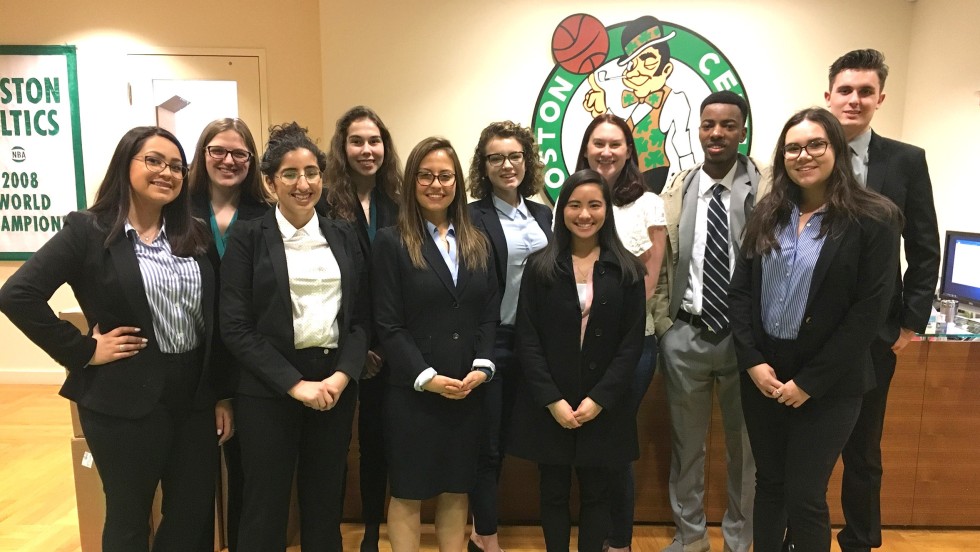Resources for Undeclared Business Majors
A robust network of advisors, events, programs and self-assessment tools makes it easy to discover your perfect major.

A Network of Support
Coming into the Meehan School as an undeclared major provides you with an opportunity explore your options and pick which one of our 11 majors best fits your interests and aspirations.
While the variety of excellent options can make choosing difficult, we make it a top priority to help you navigate to the process.
It starts with a curriculum format that allows you to try on different majors in your first year and still graduate in four years. Outside of the classroom, you’ll have the opportunity to join student groups that hold events focused on learning about career options.
Most important, you’ll be supported by full-time faculty advisors, dedicated alumni mentors and a suite of tools designed to help you assess your interests and show you what majors intersect with them.
The Explore Program (EXP): An Undeclared Advising Program
Undeclared students have the option to participate in the Explore Program (EXP), which is a targeted advising initiative for undeclared or undecided students who need additional guidance on how to change or declare a major. EXP uses intentional, cross-campus collaborations to help students decide on a major that fulfills them personally, professionally, spiritually and academically.
Our multi-tiered support system allows students to focus on graduation requirements, potential career outcomes, and life after college, helping students graduate as well-rounded candidates.
Exploratory Students
Incoming undeclared, first-year students are automatically connected with a professional advisor in the Office of Academic Services & Advising (OAS) who will serve as their primary academic advisor and guide them through the EXP process.
Undecided Students
For current upper-class students who have yet to declare a major, or are considering a major change, EXP offers structured support to guide students through the major exploration process.
One-Credit Course
Students can enroll in a one-credit course that will provide further guidance on ways to select a major while earning credit toward graduation.
On-Campus Programming
EXP students can also attend programming offered through the Residence Life Office and International Programs Office, for those students who are interested in going abroad.
Resources to Help you Define Your Goals
Take the Strong Interest Inventory
You take the Strong Interest Inventory on your own time, and then meet with a trained Career Planning Program student intern. This intern will review the results of your assessment and connect you with resources on campus based on the outcome of your conversation.
Take the FOCUS-II
This assessment takes approximately 40 minutes, and you can spend additional time researching different occupational choices, and checking out the 300+ occupational videos. You do not have to do the assessment all at once; it is self-paced and you can log back on to FOCUS at any time.
Explore Online Resources
There are a number of great websites connecting majors to careers. You can take a bottom-up approach (look at particular majors and how they connect to careers) or a top-down approach (look at particular careers and see what majors usually enter them).
Check out Handshake
The Career Development team works with the folks at Handshake to bring you a new experience in searching for jobs, internships and mentors. You can access your Handshake profile from any computer or mobile device.
Use Career and Industry Profile Websites
- Becomeopedia
- The Occupational Outlook Handbook (maintained by the U.S. Department of Labor)
- What can I do with this major?
Talk to People and Get Out There
People to See
Contact Academic Advising to discuss options and strategies for selecting your major.
- Other students: Talk with peer mentors, TAs, tutors and friends.
- Professors: Talk with your professors, especially if you are looking for advice on graduate school programs … they all did one! Department chairs are great to start with if you are thinking of joining a major.
- Academic Advisors: You have an assigned advisor for your major(s). If you prefer, you can make an appointment with a professional advisor in Academic Advising at any time (Duffy 104; 508-565-1306).
- Career Counselors: If you want to explore how majors relate to careers fields, make an appointment with a Career Development advisor (Kruse Center in Cushing-Martin Hall; 508-565-1325).
Things to Do
- Contact Career Development to discuss job shadowing, internships and occupational interviews.
- Job Shadows: A job shadow is usually short-term – anywhere from a day to a month – and is not done to gain experience in a certain field, but rather to witness a certain profession firsthand.
- Internships: An internship (usually about 3 months long) not only makes you more marketable as a job candidate, but gives you the opportunity to gain greater understanding about your chosen field.
- Informational Interviews: Informational interviews allow you to ask for career and industry advice from someone in the field. It allows you to ask the questions you need to know in order to gather information on the field.

